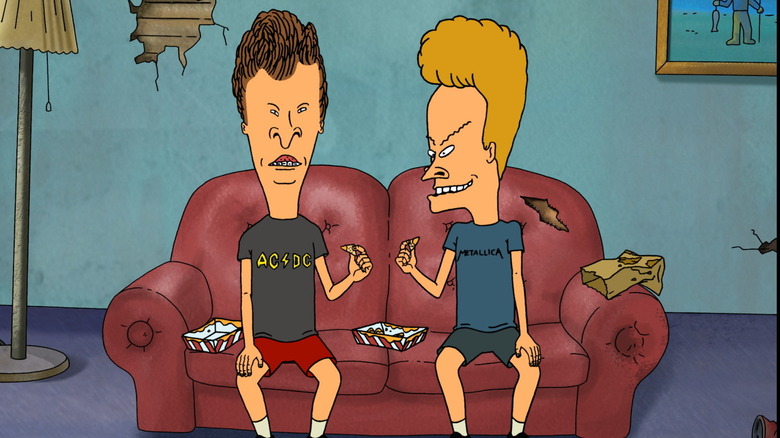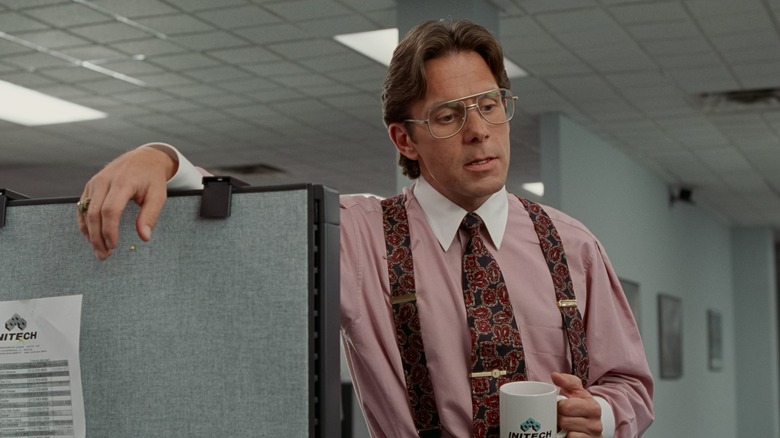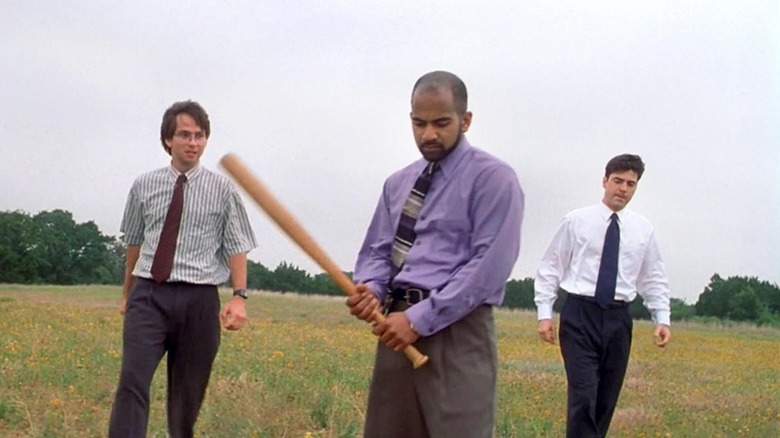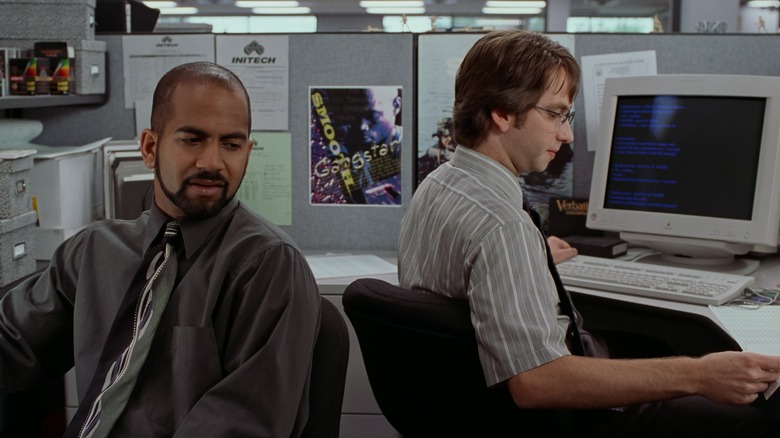How Beavis And Butt-Head Inspired One Of Office Space's Most Famous Scenes
Hey, Millennials! If you think that you're constantly taking it on the chin from Boomers — being accused of killing the golf industry, or spending too much money on avocado toast — you are getting a fraction of what they scooped onto Generation X. If Millennials are accused of narcissism, phone overuse, and bad spending habits, Gen-X was seen as a generation of shiftless, idiot slackers with no ambition. It's telling that two of the central figures of Gen-X were Mike Judge's Beavis and Butt-Head, two teenage wastoids who were only just bright enough to perceive that the world contained nachos, boobs, and GWAR videos. They were barely human, Beavis and Butt-Head, following their lizard brains (as they had no brain higher) toward whatever simplistic impulse they had in that moment.
They took the world by storm.
The success of "Beavis and Butt-Head" on MTV in 1993, and in theaters in 1996, led to an upward career trajectory for series creator Mike Judge, who would go on to create the long-lived TV series "King of the Hill" and, in 1999, the cult hit "Office Space," a film that has made its way comfortably into the world's rotation of well-worn midnight movies. Judge, it could be argued, is one of the more important voices of Generation X (he was born in 1962), codifying the monosyllabic language and devil-may-whatever performative ignorance of '90s teens. He also took Gen-X's subversive I-don't-care streak into the '90s American workplace with "Office Space," pointing out Gen-X's ambivalence and hatred of the corporate world, dissecting the illogic and horror of bland cubicles and a culture predicated on ancient proprieties that have long since mutated into a Kafka-esuqe nightmare of grunting yuppies and "funny" coffee mugs.
The Office
In a 2019 oral history of "Office Space," in order to celebrate the film's 20th anniversary, Entertainment Weekly talked to the cast and crew about their experiences making the film, the genesis of the project, and where some of the film's oft-quoted jokes originated. As one might predict, much of it sprang from a very palpable bitterness with late-'90s office culture and the workplace in general. Judge had only worked in an office for three months out of his life — he worked at Parallax Graphics immediately after college — but that was more than enough for him, and it would become the inspiration for "Milton," a series of animated shorts that aired on "Saturday Night Live" in 1991, all about a near-silent, put-upon office drone who's not really sure what he does, and who is actively abused by his superiors. In both the shorts and the film, Milton was played by Stephen Root.
Actor David Herman, who plays Michael Bolton, was also bitter about where he was, career-wise, and admits that he was actively trying to get fired from his stint on "MADtv" at the time. He tells a story of having to scream and sabotage table reads in order to be canned. By coincidence, one of Herman's old classmates from college, Jennifer Aniston, would also end up in "Office Space." Aniston was the most famous person on set, having garnered the public's attention from her work on the ultra-popular comedy series "Friends."
The Printer Scene
The plot of "Office Space" follows Peter (Ron Livingston) an unhappy office worker who spends his days unhappily pushing pencils and programming for a vaguely defined technology firm called Initech. His boss (Gary Cole) is the worst kind of passive aggressive, and his only respite during the workday is commiserating with two co-workers, Michael Bolton and Samir (Ajay Naidu).Thanks to a hypnosis mishap, Peter finds himself blissfully not caring about his job anymore, and finds the wherewithal to walk away from his bosses, disassemble his cubicle, and use Initech's endless stream of paper memos for the only thing they're really good for: wrapping fish.
His attitude spreads to Michael and Samir, and all three of them reveal that they have always hated, hated, hated the office printer. It never works properly, it stymies production. It's a bit piece of s***. In a fit of cathartic violence, our three heroes steal the printer, drive it out to a remote field, and brutally murder it. The ghoulish slaughter of the printer is one of the funniest moments in a film full of them, and one of the more relatable things for office workers in the audience. Who hasn't wanted to murder a printer at least ten times in their lives?
That printer, Judge revealed to Entertainment Weekly, was inspired by a real printer that hurt him. While writing "Beavis and Butt-Head Do America" with his screenwriting partner, Joe Stillman, Judge admits he was so frustrated by the ill-functioning of the printer that he began to form real plans about smashing it to pieces once writing was finished. And filming it. If you've worked with any printer ever, no other explanation is needed. Before humanity attempts to go all-in on 3D printers, perhaps we should spend some time perfecting the 2D ones. BECAUSE THEY STILL DON'T WORK.
Props from the Mob
According to "Office Space" cinematographer Tim Suhrstedt, the printer sequence was improvised. Naidu felt the scene should play like a mob hit, and asked himself how that would look and feel. Only instead of a stoolie, it would be a large, infuriating plastic box. Livingston doesn't actually hit the printer during the sequence, as he took on the role of mob boss in that sequence, allowing his goons to do the dirty work.
Naidu tells a story that confirms they got it right: "Years later I was in New York. Some Goodfella-looking guy says to me, 'We're huge fans. What you did with that printer was so authentic.' I think I got props from the mob."
And props from audiences as well. While "Office Space" was a bomb upon release, it became a cult hit quickly, and is now part of the pop vernacular. Judge would go on to make "Idiocracy" in 2005, a sci-fi film about a future wracked by idiocy, which also was initially a bomb, but has become a cult classic. The same was not true of 2009's "Extract," another bomb for Judge, but one that has not (yet) gained cult status. Judge hasn't made a feature film since, but has achieved great success back on TV with the 2014 office-set comedy series "Silicon Valley."
The lesson: Only three months in an office can fill you with enough rage to power a career.



